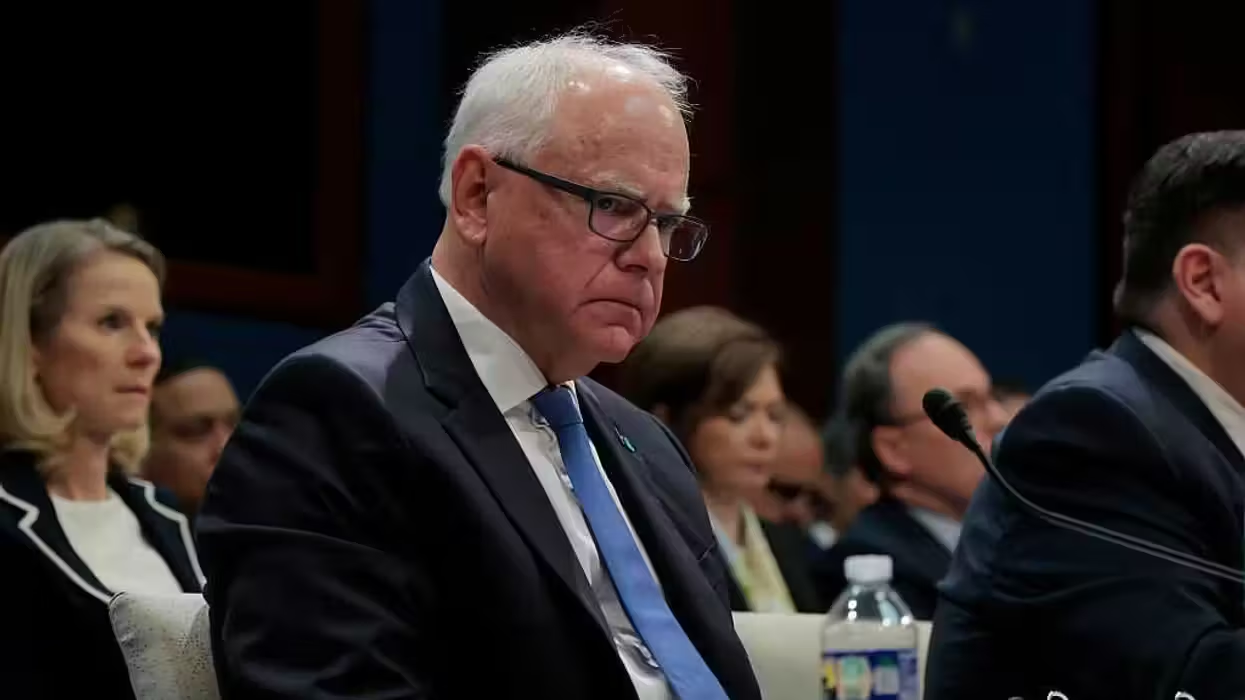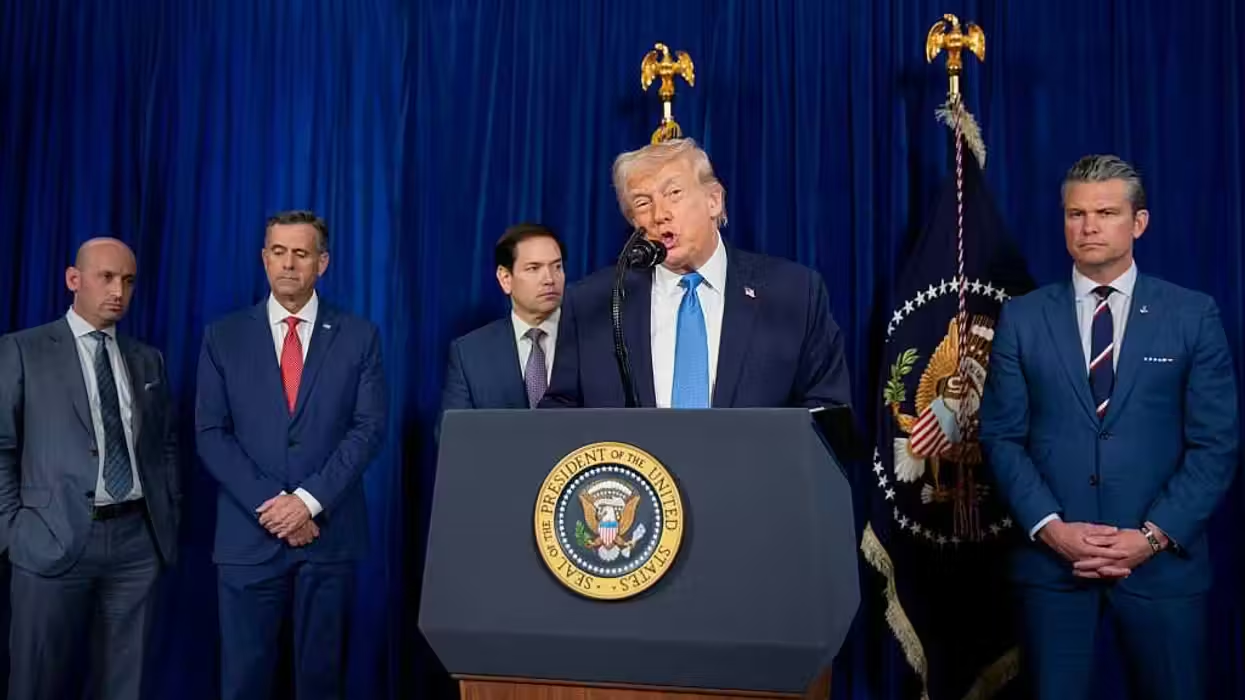The New York Times reports that “China Struggles for Balance in Response to North Korea’s Boldness.”
That “boldness” was the launch of a ballistic missile at the start of the GOP debate on Saturday evening. The launch also coincided with China’s Lunar New Year celebrations.
Why won’t, or can’t, China stop the belligerent, de-stabilizing activities of its North Korean ally? And what can the U.S. do, if anything?
 North Koreans wave their national flag as they parade in Pyongyang, North Korea, Saturday, Oct. 10, 2015. (AP Photo/Wong Maye-E)
North Koreans wave their national flag as they parade in Pyongyang, North Korea, Saturday, Oct. 10, 2015. (AP Photo/Wong Maye-E)
There are at least three primary reasons that China cannot, or will not, rein in North Korea.
As the Times noted, one reason is that China does not want another nuclear enemy on its own doorstep. But that really is not the heart of the matter. A second reason China struggles with its North Korea policy is that it does not want to be swamped with impoverished North Korean refugees if Pyongyang disintegrates. Moreover, it is in China’s interest to have a pugnacious North Korea saber-rattling at China’s traditional adversaries such as Japan, South Korea, and the U.S.
Does Beijing really worry that North Korea could turn into an enemy?
It is hard to imagine a scenario in which North Korea would direct a conventional or nuclear attack against Beijing. Rather, Beijing seems to realize that its influence over Kim Jong-Un is tenuous. China wants to maintain the influence it does have and not see a melt-down on the peninsula. It is not that China fears North Korea as an enemy, but China privately agonizes over North Korea in the way that hapless “modern” parents wring their hands at the public outbursts of a spoiled brat.
Public opinion in China seems to exasperate with the unwillingness of the Chinese government to restrain Kim Jong-Un. The same article cites a poll of 8,000 individuals by Weibo, a Chinese website, where over two-thirds said that Beijing should throttle Pyongyang. One individual wrote, “I have been racking my head but I simply can’t figure out why we have to offend everybody in the world to defend a rogue regime.” The Weibo poll has since been censored and taken offline.
What China really fears is the effects of a governmental implosion in Pyongyang, resulting in hordes of desperate refugees swamping its border into cities such as Dandong, Ji’an, and Tonghua. With as much as a third of its populace living in significant poverty, North Korea is a socio-economic time bomb. China saw what can happen when Communist regimes, like those in the former Warsaw Pact region, fall apart: lawlessness, mass emigration, and crime. It does not want to be responsible for millions of starving Koreans. Nor does it want North Korean hackers attacking its economy, a chemical or radiological spill, or an ecological disaster (PBS calls it North Korea’s “environmental collapse”).
Finally, and most importantly, it is actually in China’s interest for North Korea to play the international bad boy.
North Korea’s bullying is generally directed at U.S. allies such as South Korea and Japan. No one, including the Russians, wants to see North Korea bring on Doomsday (Russia’s critical Pacific port, Vladivostok, is only a few hundred kilometers away). China can blame the U.S. and its allies’ policies for North Korea’s bad behavior: if the allies strengthen their arsenals ostensibly against North Korea, China can declare those weapons are actually directed at Beijing. In other words, North Korea provides smoke confusing the issues around some of China’s rapid military growth and aggressive behavior in the region.
If China is unlikely to act, what can the U.S. do?
Unfortunately, the policies of the past 20 years have done little to stop this rogue government from bad behavior. In fact, the opposite has occurred. Every time that North Korea throws a tantrum, it has received goodies such as energy and energy credits, food for its starving population, and other benefits from the international community. Bill Clinton’s caving in to North Korea in 1994 is a case in point.
Unfortunately, South Korea has been on a roller coaster with the moodiness of Pyongyang, at times trying to woo North Korea with a “sunshine policy” while attempting to support a robust military deterrent. The North-South Korea dynamic is extremely personal and nuanced, with family ties tortured by the border. Furthermore, no Western power has a strong relationship with Pyonyang, and at times U.S. policy has been undercut by its own citizens (such as Jimmy Carter’s un-approved 2011 mission during the first Obama presidency).
China remains in the best position to isolate and influence Kim Jong-Un, but it is unclear what would cause it to do so. The North Korean oligarchy seems firmly entrenched with massive military might available to continue coercing its own citizenry; one wonders if a repeat of the fall of Ceausescu in Romania could be accomplished in North Korea without outside help? To date, and in accordance with international law, no external power—except Hollywood—has been implicated in an assassination attempt that could result in regime change. Now that our policies have failed to contain North Korea’s nuclear and ballistic missile programs, it seems most likely that only a robust deterrence will keep North Korea in a box.
Before North Korea went nuclear, the West had another option: a targeted military strike within North Korea’s borders. There are many options how this could have been handled, including an attack on a specific location with little or no loss of life to demonstrate resolve (and what was coming next) should Pyongyang continue to prove intransigent. It is likely those day are behind us, and now China must take a greater responsibility for peace on the North Korean peninsula lest it awake to an ecological, cyber, humanitarian, or other disaster on its rear door-step.
Eric Patterson, Ph.D. is Dean of the Robertson School of Government at Regent University and the author of several books, including Ending Wars Well (Yale University Press, 2012).
–
TheBlaze contributor channel supports an open discourse on a range of views. The opinions expressed in this channel are solely those of each individual author.


 North Koreans wave their national flag as they parade in Pyongyang, North Korea, Saturday, Oct. 10, 2015. (AP Photo/Wong Maye-E)
North Koreans wave their national flag as they parade in Pyongyang, North Korea, Saturday, Oct. 10, 2015. (AP Photo/Wong Maye-E)






